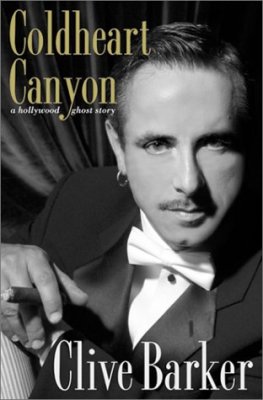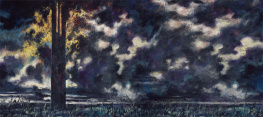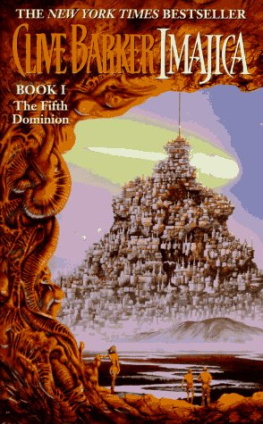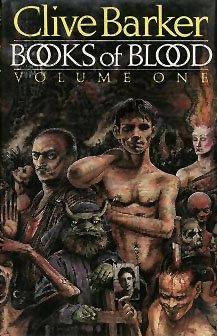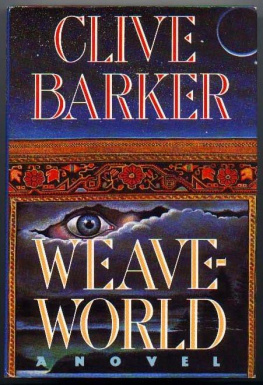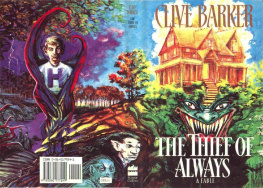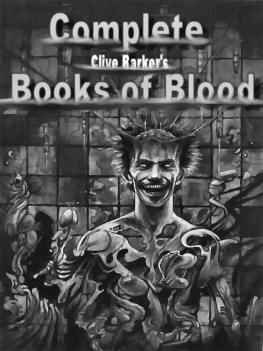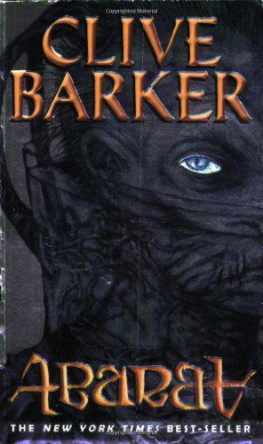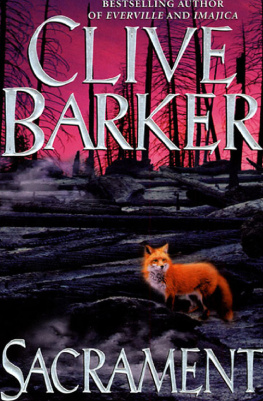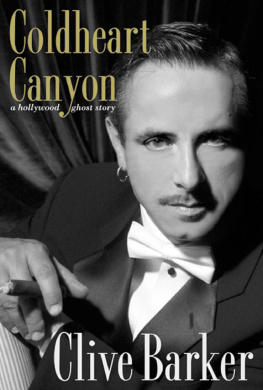Clive Barker - Coldheart Canyon
Here you can read online Clive Barker - Coldheart Canyon full text of the book (entire story) in english for free. Download pdf and epub, get meaning, cover and reviews about this ebook. genre: Science fiction. Description of the work, (preface) as well as reviews are available. Best literature library LitArk.com created for fans of good reading and offers a wide selection of genres:
Romance novel
Science fiction
Adventure
Detective
Science
History
Home and family
Prose
Art
Politics
Computer
Non-fiction
Religion
Business
Children
Humor
Choose a favorite category and find really read worthwhile books. Enjoy immersion in the world of imagination, feel the emotions of the characters or learn something new for yourself, make an fascinating discovery.
- Book:Coldheart Canyon
- Author:
- Genre:
- Rating:3 / 5
- Favourites:Add to favourites
- Your mark:
- 60
- 1
- 2
- 3
- 4
- 5
Coldheart Canyon: summary, description and annotation
We offer to read an annotation, description, summary or preface (depends on what the author of the book "Coldheart Canyon" wrote himself). If you haven't found the necessary information about the book — write in the comments, we will try to find it.
Coldheart Canyon — read online for free the complete book (whole text) full work
Below is the text of the book, divided by pages. System saving the place of the last page read, allows you to conveniently read the book "Coldheart Canyon" online for free, without having to search again every time where you left off. Put a bookmark, and you can go to the page where you finished reading at any time.
Font size:
Interval:
Bookmark:
Clive Barker
Coldheart Canyon
PROLOGUE. THE CANYON
It is night in Coldheart Canyon, and the wind comes off the desert.
The Santa Anas, they call these winds. They blow off the Mojave, bringing malaise, and the threat of fire. Some say they are named after Saint Anne, the mother of Mary, others that they are named after one General Santa Ana, of the Mexican cavalry, a great creator of dusts; others still that the name is derived from santanta, which means Devil Wind.
Whatever the truth of the matter, this much is certain: the Santa Anas are always baking hot, and often so heavily laden with perfume that it's as though they've picked up the scent of every blossom they've shaken on their way here. Every wild lilac and wild rose, every white sage and rank jimsonweed, every heliotrope and creosote bush: gathered them all up in their hot embrace and borne them into the hidden channel of Coldheart Canyon.
There's no lack of blossoms here, of course. Indeed, the Canyon is almost uncannily verdant. Some of the plants here were brought in from the world outside by these same burning winds, these Santa Anas; others were dropped in the feces of the wild animals who wander through -- the deer and coyote and raccoon; some spread from the gardens of the great dream palace that lays solitary claim to this corner of Hollywood. Alien blooms, this last kind -- orchids and lotus flowers -- nurtured by gardeners who have long since left off their pruning and their watering, and departed, allowing the bowers which they once treasured to run riot.
But for some reason there is always a certain bitterness in the blooms here. Even the hungry deer, driven from their traditional trails these days by the presence of sightseers who have come to see Tinseltown, do not linger in the Canyon for very long. Though the deer venture along the ridge and down the steep slopes of the Canyon, and curiosity, especially amongst the younger animals, often leads them over the rotted fences and toppled walls into the secret enclaves of the gardens, they seldom choose to stay there for very long.
Perhaps it isn't just that the leaves and petals are bitter. Perhaps there are too many whisperings in the air around the ruined gazebos, and the animals are unnerved by what they hear. Perhaps there are too many presences brushing against their trembling flanks as they explore the clotted pathways. Perhaps, as they graze the overgrown lawns, they lookup and mistake a statue for a pale fragment of life, and are startled by their error, and take flight.
Perhaps, sometimes, they are not mistaken.
Perhaps.
The Canyon is familiar with perhaps; with what may or may not be. And never more so than on such a night as this, when the winds come sighing off the desert, heavy with their perfume, and such souls as the Canyon hosts express their longing for something they dreamed they had, or dreamed that they dreamed, their voices so tenuous tonight that they're inaudible to the human ear, even if there were someone to hear them, which there never is.
That's not entirely true. On occasion somebody will be tenacious enough to find their way into this vale of luxury and tears; a tourist, perhaps even a family of tourists, foolishly determined to discover what lies off the prescribed route; looking for some famous heart-throb's love-nest, or a glimpse of the idol himself, caught unawares as he walks with his dog. There are even a few trespassers over the years who have found their way here intentionally, guided to this place by hints dropped in obscure accounts of Old Hollywood. They venture cautiously, these few. Indeed there is often something close to reverence in the way they enter Coldheart Canyon. But however these visitors arrive, they always leave the same way: hurriedly, with many a nervous backward glance. Even the crassest of them -- even the ones who'd claim they don't have a psychic bone in their bodies -- are discomfited by something they sniff here. Their sixth sense, they have discovered, is far more acute than they had thought. Only when they have outrun the all-too-eager shadows of the Canyon and they are back in the glare of the billboards on Sunset Boulevard, do they wipe their clammy palms, and wonder to themselves how it was that in such a harmless spot they could have been so very afraid.
PART ONE. THE PRICE OF THE HUNT
ONE
"Your wife did not want to look around the Fortress any further, Mister Zeffer?" Father Sandru said, seeing that on the second day the middle-aged man with the handsome, sad face had come alone.
"The lady is not my wife," Zeffer explained.
"Ah ... " the monk replied, the tone of commiseration in his voice indicating that he was far from indifferent to Katya's charms. "A pity for you, yes?"
"Yes," Zeffer admitted, with some discomfort.
"She's a very beautiful woman."
The monk studied Zeffer's face as he spoke, but having said what he'd said, Zeffer was unwilling to play the confessee any further.
"I'm her manager," he explained. "That's all there is between us."
Father Sandru, however, was not willing to let the issue go just yet. "After the two of you departed yesterday," he said, his English colored by his native Romanian, "one of the brothers remarked that she was the most lovely woman he had ever seen ... " he hesitated before committing to the rest of the sentence " ... in the flesh."
"Her name's Katya, by the way," Zeffer said.
"Yes, yes, I know," said the Father, his fingers combing the knotted gray-white of his beard as he stood assessing Zeffer.
The two men were a study in contrasts. Sandru ruddy-faced and rotund in his dusty brown habit, Zeffer slimly elegant in his pale linen suit.
"She is a movie-star, yes?"
"You saw one of her films?"
Sandru grimaced, displaying a poorly-kept array of teeth. "No, no," he said. "I do not see these things. At least not often. But there is a little cinema in Ravbac, and some of the younger brothers go down there quite regularly. They are great fans of Chaplin, of course. And there's a ... vamp ... is that the word?"
"Yes," Zeffer replied, somewhat amused by this conversation. "Vamp's the word."
"Called Theda Bara."
"Oh, yes. We know Theda."
In that year -- which was 1920 -- everybody knew Theda Bara. She had one of the most famous faces in the world. As, of course, did Katya. Both were famous; their fame tinged with a delicious hint of decadence.
"I must go with one of the brothers when they next go to see her," Father Sandru said.
"I wonder if you entirely understand what kind of woman Theda Bara portrays?" Zeffer replied.
Sandru raised a thicketed eyebrow. "I am not born yesterday, Mister Zeffer. The Bible has its share of these women, these vamps. They're whores, yes; women of Babylon? Men are drawn to them only to be destroyed by them?"
Zeffer laughed at the directness of Sandru's description. "I suppose that's about right," he said.
"And in real life?" Sandru said.
"In real life Theda Bara's name is Theodesia Goodman. She was born in Ohio."
"But is she a destroyer of men?"
"In real life? No, I doubt it. I'm sure she harms a few egos now and again, but that's about the worst of it."
Father Sandru looked mildly disappointed. "I shall tell the brothers what you told me," he said. "They'll be very interested. Well then ... shall I take you inside?"
Matthias Zeffer was a cultured man. He had lived in Paris, Rome, London and briefly in Cairo in his forty-three years; and had promised himself that he would leave Los Angeles -- where there was neither art nor the ambition to make art -- as soon as the public tired of lionizing Katya, and she tired of rejecting his offer of marriage. They would wed, and come back to Europe; find a house with some real history on its bones, instead of the fake Spanish mansion her fortune had allowed her to have built in one of the Hollywood canyons.
Font size:
Interval:
Bookmark:
Similar books «Coldheart Canyon»
Look at similar books to Coldheart Canyon. We have selected literature similar in name and meaning in the hope of providing readers with more options to find new, interesting, not yet read works.
Discussion, reviews of the book Coldheart Canyon and just readers' own opinions. Leave your comments, write what you think about the work, its meaning or the main characters. Specify what exactly you liked and what you didn't like, and why you think so.

